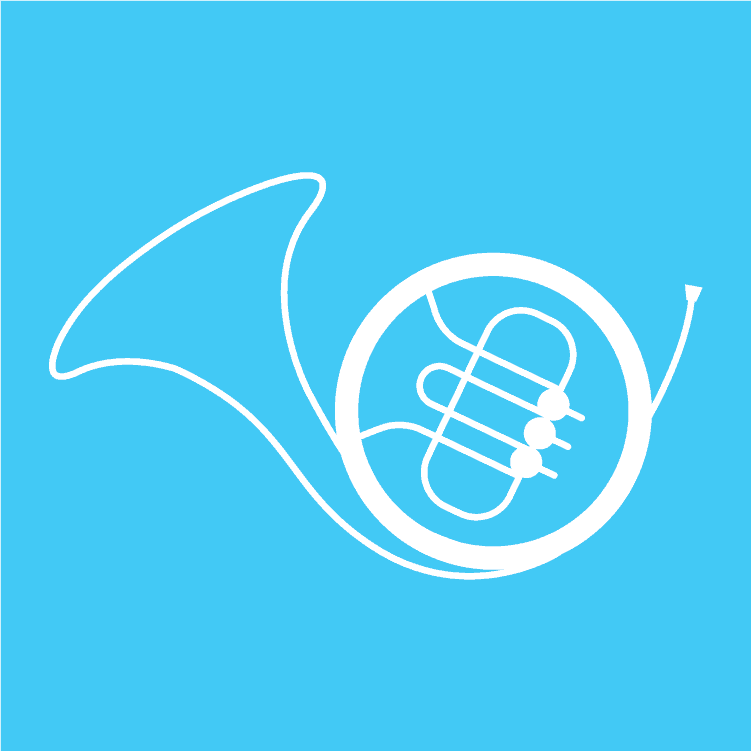French Horn FAQ's
Frequently Asked Questions
Welcome to our ‘Beginner’s Guide To Learning The French Horn’ series. Our French Horn FAQs are designed to assist you with common enquiries that people often have.

Choosing An Instrument
Before everything else, you must understand that buying a new French horn is already considered an investment. That means you have to be smart when picking your first instrument. So choose something that fits your budget, skill level, and experience firsthand. You wouldn’t want to buy something very expensive or very cheap for that matter, so you have to find that middle ground. Beginners would be advised to go for something simpler like a single horn, whereas advanced players would benefit better from something like a double, or even a triple horn. Also, try going for reputable brands such as Yamaha, Mendini, and Conn, to name a few.
Used French horns can be significantly less expensive than brand new ones. For instance, you might be able to buy a high-tier instrument for way less than what you would have paid for it if it were brand new. If you want numbers, here’s a baseline: expect to pay at least $1494 (£1130) for a really good and well-maintained secondhand horn. Anything cheaper than this, and it’s very likely that the horn has issues that would need immediate attention. So be wary about that.
It’s impossible to give an exact number because French horns will vary a lot in value depending on several factors. You can never really depend on only two criteria such as the instrument’s age and model. The final price depends on other things as well, including how well-maintained the instrument is for its age, the material used in manufacturing it, its brand, and if or not it’s still playable. In order to determine an exact number, you’ll have to take the instrument to an expert for a proper appraisal.
Maintenance
Like any other wind instrument, the French horn’s biggest enemy is moisture buildup. This is due to warm air coming out of the player’s mouth touching the relatively colder environment of the horn and condensing as a result. Your foremost agenda is to dry the horn out and absorb as much of the moisture as you can, to prevent it from collecting inside and wreaking havoc. As for the exterior, be sure to wipe down the horn with a soft, clean cloth to remove marks such as fingerprints. A specialist cleaning/care kit is the perfect solution.
It depends. Valve oil is a thinner type of oil which would work perfect;y for a horn with newer, fresher valves. For an instrument that has seen better days, you will have to use a heavier oil such as rotor oil. This is due to older horns being a lot “clunkier” than most (for the lack of a better term). But you can never ever use rotor oil on the inside, however! That’s where you can use valve oil instead, because it can protect the inside of the rotor from corrosion due to saliva buildup. This excellent horn care kit contains three types of oil, so you’ll have every need covered.
Technique
Place your index, middle, and ring finger on the first three keys. And with proper lip technique (embouchure), place your lips on the mouthpiece and blow air into it without pressing any valve. But that’s not all you need, obviously. With proper training and practice, you will learn and master how to properly press which keys to produce whichever notes you need to make. And here’s another thing: the more air you blow into the horn, the louder the notes will sound and vice versa. We’ve covered the question in greater depth in our How to play the French Horn article.
It depends. If you’re using an F horn, then you should focus on practising passages exclusively made for it for a longer amount of time compared to if you’re using a double horn. You can also try drone practice, which helps develop your inner ear and overall musicality. This can also be useful for mastering scales and lyrical passages. And lastly, practise using different vowel sounds to achieve better accuracy. Or you could whistle so you get the feel of various tongue positions and vowel sounds. To find out more about practicing the French horn and improving your French Horn technique you can check out our dedicated articles in this beginner’s guide.
About the Author
Anna Drysdale
General French Horn FAQs
The name “French horn” itself has a long and colourful history, dating back to the 1600, where hunting horns were popular. During this era, horns were classified by the place where they’re made, and the French were especially good at making hunting horns. In modern times, it really doesn’t matter what you call the instrument, because “horn” and “French horn” can be used almost interchangeably. Not all the time, however, so be wary about that.
Not the hardest, but one of the hardest. Playing it well requires mastery of a lot of partials, which is considerably more compared to other brass instruments. High notes tend to be really close to one another too, which might make beginners miss the notes all too often. A lot of learners actually take a long time just learning how to move their mouth around to get a good enough sound. So yes, the French horn is a very difficult instrument to learn, but the good news is that our guide on French horn learning methods is a great place to start.

Join Us Now To Get The 4 Things I’ve Been Loving & Reviewing
4-Feature Friday does just what it says on the tin; delivers you an email every Friday with four of the most extraordinary things I’ve found that week
We promise no junk. Just one single email message, every week, with excellent ideas and tips on anything at all I’ve discovered that I believe you’ll like. It could be popular music, instruments, books, cool gadgets. Anything. So long as it’s terrific.
Receive access now by simply clicking below:




